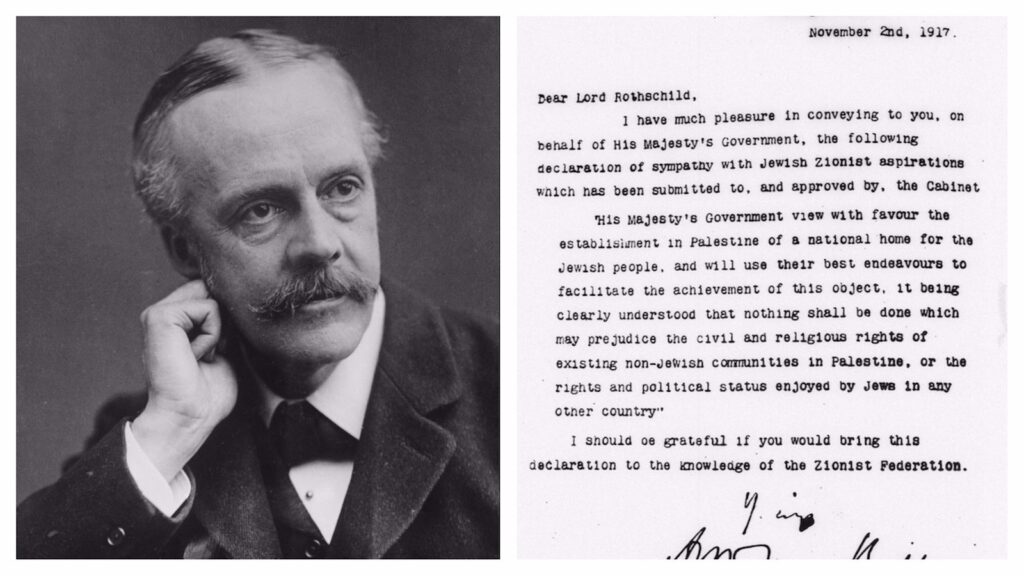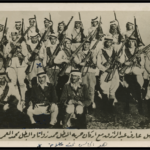PrepareBalfour Declaration , which I committed toBritain During World War I, by supporting the establishment of a national homeland for the Jews in Palestine, it was without a doubt one of the most influential political documents of the last century. The inclusion of this promise in Britain’s mandate from the League of Nations over Palestine means, in one way or another, that international law guarantees it, and thus it became a promise. Balfour established the guiding principle for British rule of the country for the next thirty years, to be finally implemented with the establishment of Israel in 1948, which changed the face of the Middle East and its history.
The promise was in the form of a short letter dated 2 November 1917 from the British Foreign SecretaryLord Arthur James Balfour To the President of the Jewish Community in Britain, LordLionel Walter de Rothschild After the British Council of Ministers approved the promise, the text of which was as follows:
“His Majesty’s Government view with favor the establishment in Palestine of a national home for the Jewish people, and will use their utmost endeavors to facilitate the achievement of this goal, with it being clearly understood that no action will be taken which might abridge the civil and religious rights enjoyed by the non-Jewish communities residing in Palestine, nor the rights or political status enjoyed by Jews in any other country.”
The Balfour Declaration was the result of the efforts of Zionist supporters within the British government (including Balfour and the Prime MinisterDavid Lloyd George And a member of the House of LordsHerbert Samuel ) and outside. And he playedChaim Weizman President of the British Zionist Federation since February 1917 and a very lively and persuasive Zionist spokesman, he played a very important role in these efforts, as he had a close and long-term relationship with both Balfour and Lloyd George andWinston Churchill And other influential figures from the political elite.
From a strategic perspective, British officials hoped that their “favourable consideration” of the establishment of a Jewish national home in Palestine would win them the support of American Jews andGermany Russia and their war efforts, and they also aimed to consolidate their claim to Palestine after the war, which would support their control over Egypt and the Suez Canal.
The promise was prepared and formulated in the midst of World War I, when Great Britain andFrance They contemplated seizing the Arab provinces of the Ottoman Empire after the war, anticipating an Allied victory over the German-led Axis forces. These two Western powers had previously negotiated, with the approval of the Ottoman Empire, the distribution of the Arab provinces between the spheres of French and British influence, so that Lebanon and Syria would be under French control, and both Iraq andEast Jordan And part of Palestine (the Haifa-Acre area, and the area extending from Gaza to the Dead Sea, includingNegev ) under British control. As for the rest of Palestine, it is under international administration. The two countries signed the secret treaty (known asSykes-Picot Agreement ) in May 1916, but it was not announced publicly until November 1917 after the Bolshevik Revolution. However, during the same period, he was the British High Commissioner in EgyptSir Henry McMahon He secretly promised Sharif Hussein, the Sharif of Mecca, that Britain would support Arab independence after the war, and based on these guarantees, an Arab military force under the command of Prince Faisal, son of Sharif Hussein, launched a revolt against the Ottomans in June 1916.
The Balfour Declaration directly contradicted Britain’s promises to the Arabs. Shortly after its issuance, British forces entered Palestine and seized Jerusalem in December 1917, then completed the occupation of the country by October 1918. A military government was imposed in Palestine, which It was allowed to begin consecrating the foundations of the Jewish national homeland on the ground in accordance with the Balfour Declaration even before the official British mandate over Palestine: in July 1920, a well-known Zionist, Sir Herbert Samuel, became the first High Commissioner to Palestine, and in August the new civil administration approved the first A Jewish immigration decree, thus opening the doors of Palestine to subsequent immigration.
In the meantime, he foundedParis Peace Conference in 1919 The League of Nations, and introduced into international law the concept of “trusteeship” known as the mandate system. Article 22 of the League of Nations Covenant states that the territories of the defeated countries will be subject to “the guardianship of the developed countries” on behalf of the League until they are able to govern themselves. Specifically, Article 22 recognized the Arab provinces that were under Ottoman authority as “independent states” subject to the administrative assistance of a mandated power. Although the League of Nations Covenant stipulated that the wishes of the communities should “have first place in the selection of the mandatory state,” the mandate for Palestine (as well as Transjordan and Iraq) was granted to Britain inSan Remo Conference In April 1920.
The Mandate for Palestine, approved by the Council of the League of Nations on July 24, 1922, included a preamble and 28 articles:
The preamble affirmed Britain’s commitment to the Zionist project in the same terms stated in the Balfour Declaration, and justified this with an argument that was not mentioned in the British Foreign Secretary’s promise, which is its recognition of “the historical connection linking the Jewish people to Palestine.” As for the reference to the majority of the population of Palestine (about 90 percent, according to the British census in 1922, who were Muslim and Christian Arabs), the preamble repeated the phrase “non-Jewish sects in Palestine” and the principle of not diminishing the “civil and religious rights” of these sects, and omitted It also mentions the political or national rights of Arabs.
In exchange for restricting Arab rights and referring to them briefly in the preamble, the articles of the Mandate were filled with texts detailing Britain’s various responsibilities for sponsoring the Zionist project in Palestine: Article Two made Britain responsible “for placing the country in political, administrative and economic conditions that guarantee the establishment of the Jewish national homeland,” and Article Four Recognized the Zionist Organization (under the name Jewish Agency ) as the body responsible for “advising and cooperating with Britain” on all matters that “may affect the establishment of the Jewish national home and the interests of the Jewish population in Palestine,” while no similar body was recognized by the Arab majority. As for Article Six, it guaranteed Britain’s commitment to “facilitate the immigration of Jews and encourage their close settlement on land, including princely lands and dead lands not required for public purposes.” Article 7 stressed that the new citizenship law should include “texts that facilitate the acquisition of Palestinian nationality for Jews,” and Article 22 granted the Hebrew language an equivalent status to the Arabic language as an official language in Palestine… and so on.
The Mandate for Palestine officially entered into force on September 29, 1923, and from the beginning the Arab population expressed its opposition to Balfour’s policy in many ways, including demonstrations and violent clashes in April 1920 and May 1921. Opposition to the Balfour Declaration dominated the agendas of the Palestine Arab Conference meetings ( held in January and February 1919, and in May 1920, and in December 1920, and in June 1921, and in August 1922, and in June 1923 and June 1928) and the delegations he sent toLondon (From August 1921 to July 1922, July 1923, and April 1930). The continuing Palestinian opposition was the motivation behind the White Paper issued by Colonial Secretary Winston Churchill in 1922, in which he sought to clarify that Britain’s intention was to establish a national homeland for the Jews in Palestine and not to transform the entirety of Palestine into a homeland for the Jews, but this clarification did nothing to calm the Arab majority. of the country’s population, successive investigation committees have directed (King-Crane Commission America in 1919,Palin Commission of Inquiry British in 1920,Haycraft Committee The year 1921 and all successive British committees until the end of the Mandate) witnessed massive Arab opposition to Balfour’s policy and its consequences.
In response to the Arab movements, the British government paralyzed all efforts of the Palestinian Arab population aimed at achieving independence, as it actually considered any move to obtain any representation within the administration – even relative – or privileges that might reflect some of the will of the majority, as a repudiation of its commitment. With the project of building a national homeland for the Jews in Palestine.
The tension resulting from British reluctance to aid the “self-determination” promised by the League of Nations, and the Mandate’s preference for the national aspirations of a largely alien minority, remained a constant source of conflict and dissatisfaction throughout the Mandate, as did the transformation brought about by the influx of Jewish immigrants and the development of Zionist institutions. While the other areas subject to the British Mandate received nominal independence (Iraq in 1932 and Jordan in 1946), the Mandate in Palestine established structures that allowed the Zionist movement to dominate the indigenous population, which in 1948 made them taste homelessness and expulsion instead of independence.
If Arabs and Jews were ever to agree on anything, it would be on the decisive importance of the Balfour Declaration for both of them. Since 1918, Arabs throughout Palestine have observed November 2 (Balfour Declaration Day) as a day of mourning, and they hold demonstrations and organize strikes. The public and they set off revolutions (the British suppression of the 1936 revolution put an end to it). The Jewish community in Palestine considers this day a national holiday, and they celebrate it from the year 1918 until the end of World War II.
Given the possibilities of failure surrounding the Zionist project in 1917, and the facts on the ground, we are not exaggerating if we say that without the Balfour Declaration, Israel would not have existed.


